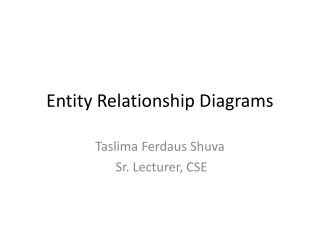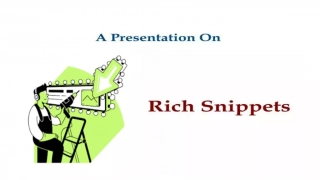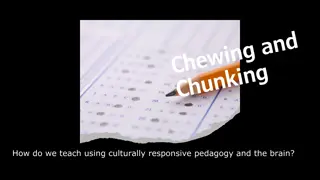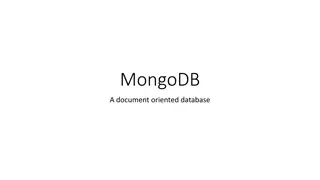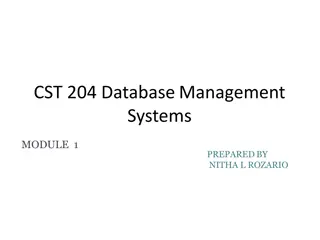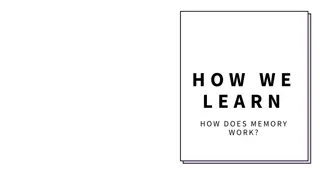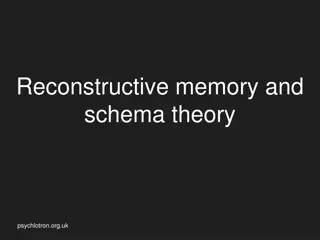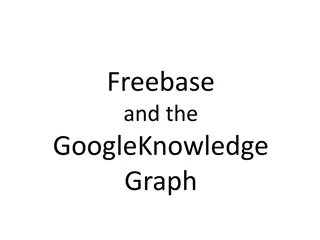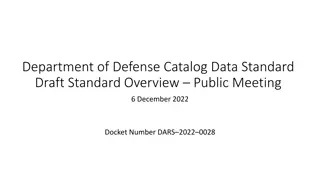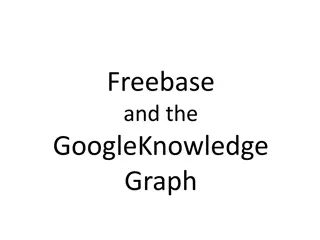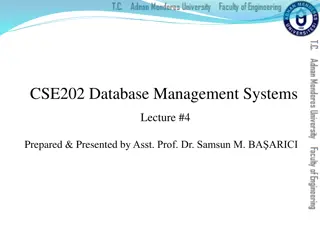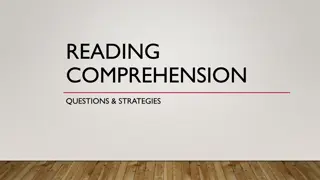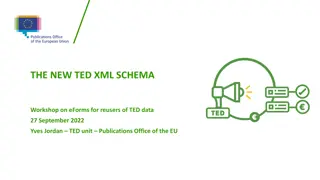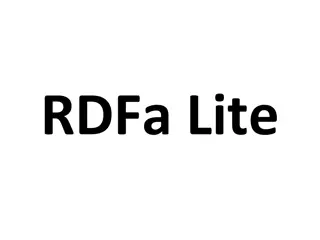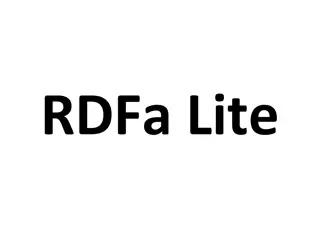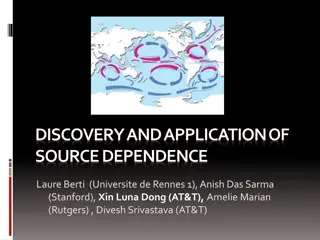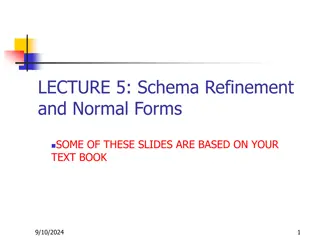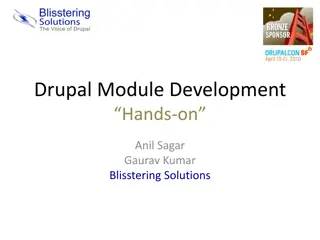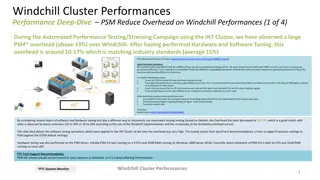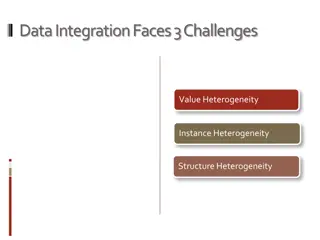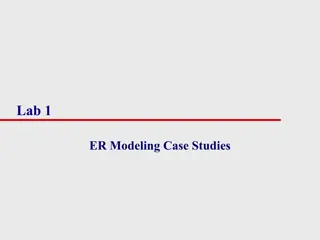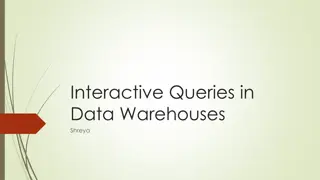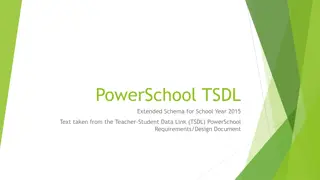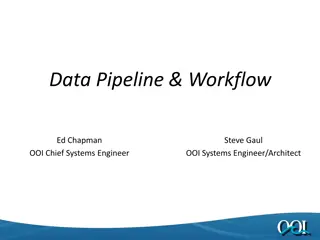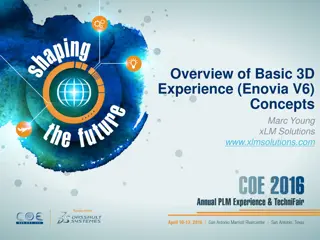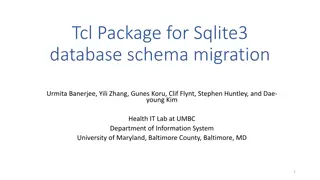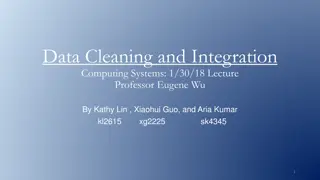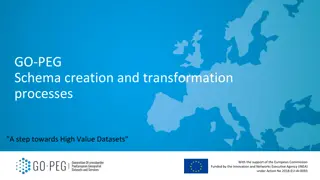Virginia Health Insurance Market Insights 2024
Gain insights into Virginia's health insurance market trends and key issues for 2024. Explore carrier rates, market shares, and enrollment projections. Confidential data provided. Images and data source in schema format.
1 views • 52 slides
Entity Relationship Diagrams
Understand entities, attributes, relationships, and database design stages. Learn about conceptual and logical designs, ER diagrams, and conversion to relational schemas. Explore ER models, schema, and basic concepts for effective database design.
2 views • 21 slides
Stand Out in Search: The Art of Rich Snippet Optimization
\nRich snippets are enhanced search results that provide additional information beyond traditional titles and meta descriptions. Achieved through structured data markup, such as JSON-LD or Microdata, rich snippets offer a more detailed preview of webpage content in search engine results. Examples in
1 views • 8 slides
Guidelines for Designing Person-Centered Care Pathway Schemas
This document provides a template and writing instructions for creating schemas for person-centered and integrated care pathways. It offers insights on visualizing the steps of a care pathway and emphasizes clear communication in the design process. Contact details are included for further guidance.
6 views • 21 slides
Understanding Active Directory: Key Components and Security Considerations
Active Directory is a crucial component in Windows networks, providing centralized resource management, authentication, and authorization services. Key components include objects, domains, domain controllers, OUs, forests, and group policies. Understanding the data store, NTDS.dit file, partitions,
6 views • 68 slides
Understanding Culturally Responsive Pedagogy and Brain-Based Learning
This comprehensive guide explores the integration of culturally responsive pedagogy and brain-based learning to empower students by retaining their cultural identity while succeeding academically. Key concepts include the role of culture in learning, information processing models, working memory, an
0 views • 11 slides
MongoDB vs. Relational Databases: Myth vs. Reality in NoSQL Design
MongoDB is a document-oriented database that challenges traditional relational databases by offering flexible schema designs. While myths suggest no need for schema design or relationships in MongoDB, the reality emphasizes the importance of thoughtful schema design and choice in data relationships.
2 views • 21 slides
PowerSchool Staff Information Updates for School Year 2015
Updates to Michigan State Report Information for Staff Members include special considerations for excluding teachers from certain data submissions, handling LEP and Special Education instructors, and more. It is recommended to complete the consolidate users function before running the teacher extend
0 views • 6 slides
Introduction to Database Management Systems
Understanding the fundamentals of Database Management Systems (DBMS), including data models, schema architecture, entity-relationship models, and the role of DBMS in storing, manipulating, and analyzing data efficiently. Explore the significance of database systems in managing information and ensuri
0 views • 132 slides
Understanding Memory and Effective Study Strategies
Discover how memory works, learn about effective study strategies, explore the Ebbinghaus Forgetting Curve, and delve into the concept of schema to improve learning outcomes. Uncover the importance of revision, differentiate between ineffective and effective study methods, and engage in activities l
1 views • 14 slides
Understanding Reconstructive Memory and Schema Theory in Psychology
Explore the concepts of reconstructive memory and schema theory in psychology, delving into how encoding, storing, and retrieving information in long-term memory can lead to alterations based on our stored knowledge and experiences. Discover how schemas influence our interpretation of events, impact
0 views • 9 slides
Evolution of Freebase and the Google Knowledge Graph
Freebase was initially created in 2005 as an open shared database of knowledge, later acquired by Google and absorbed into the Google Knowledge Graph. Its approach included crowdsourcing updates and additions, focusing on data rather than text. The schema of Freebase included around 1500 types, 3500
1 views • 12 slides
Understanding the Implementation of XML Results File G for Exams in England and Wales
The XML Results File G is introduced as a new method to provide schools with additional exam data beyond overall results. Initially used by four boards, the file follows the A2C XML Schema for compatibility with SIMS7 and NextGen. While optional for now, the XML file naming convention and guidelines
1 views • 43 slides
Department of Defense Catalog Data Standard Draft Public Meeting Overview
The Department of Defense is hosting a public meeting on December 6, 2022, to discuss the draft Catalog Data Standard. The meeting will cover administrative matters, submission of comments, technical architecture, and open discussions on use cases. Attendees are encouraged to provide input on areas
0 views • 16 slides
Evolution and Demise of Freebase and the Google Knowledge Graph
Freebase was launched in 2005 as an open database of knowledge, initially populated with Wikipedia data and later incorporating crowdsourced updates. Acquired by Google in 2010, it was transitioned into Google's Knowledge Graph before being decommissioned in 2016. The schema contained around 1500 ty
4 views • 12 slides
High-Level Conceptual Data Modeling in Database Management Systems
Explore the world of high-level conceptual data modeling in database management systems through understanding ER and UML notations, designing entity-relationship models, and translating conceptual designs into practical implementation phases. Learn about data requirements analysis, database schema d
1 views • 79 slides
Understanding Reading Comprehension: Questions and Strategies
Reading comprehension involves the ability to extract meaning from text through conscious processes before, during, and after reading. Good readers are adept at adjusting their reading based on the difficulty level of the text and utilizing strategies like activating background knowledge, monitoring
1 views • 37 slides
Workshop on eForms for Reusers of TED Data: New XML Schema Insights
Delve into the latest TED XML schema developments at the workshop, exploring challenges, benefits for re-users, available resources, and more. Learn about new concepts, rules, and the OASIS Universal Business Language standard. Discover how tailoring extensions and balance enhance stability and flex
0 views • 10 slides
Understanding RDFa Lite: A Simplified Approach to Structured Data Markup
RDFa 1.1 Lite is a subset of RDFa 1.1 that simplifies structured data markup by employing attributes like vocab, typeof, property, resource, and prefix. It works seamlessly with schema.org terms, enabling easy integration of structured data into web content. The comparison of RDFa Lite with Microdat
2 views • 7 slides
Understanding RDFa Lite: A Simplified Approach to Structured Data
RDFa 1.1 Lite is a subset of RDFa 1.1 with five simple attributes: vocab, typeof, property, resource, and prefix. It is fully compatible with RDFa 1.1 and works well with schema.org terms. This structured data format provides a straightforward method for adding context to web content, allowing for i
2 views • 7 slides
Challenges and Solutions in Data Integration
Facing challenges like data conflicts, instance and structure heterogeneity, the field of data integration encounters complexities in schema matching, model management, and query answering. Existing solutions assuming independence of data sources are now impacted by advanced technologies enabling ea
0 views • 22 slides
Database Schema Refinement and Normal Forms Explained
Explore the concept of schema refinement and normal forms in database management. Understand issues like insertion, deletion, and update anomalies in database tables. Learn about set-valued attributes and their implications in designing databases for tracking customer transactions.
2 views • 69 slides
Hands-On Drupal Module Development Guide
Unleash your potential with this comprehensive guide on Drupal module development. Explore Drupal architecture, database structures, module types, and hands-on tweet scope. Dive into module architecture, hook implementation, form API, permissions, schema API, and more. Enhance your skills in modifyi
0 views • 86 slides
Windchill Cluster Performance Deep-Dive: PSM Overhead Reduction Strategies
During an automated performance testing campaign, a large PSM overhead was observed over Windchill, which was reduced to around 10-17% through hardware and software tuning efforts. Various recommendations and strategies were shared, including turning off UEM if not required, avoiding monitoring remo
0 views • 4 slides
Overview of Open Provenance Model Tutorial Session 3
Explore Session 3 of the Open Provenance Model Tutorial, covering topics like the XML Schema for OPM, OWL ontology, OPM Layered Architecture, XML Binding, RDF Binding, and more. Dive into OPM Layered Model, XML Binding, OPM Graph, OPM Process, and OPM Artifact to understand specialized domains and e
0 views • 22 slides
Challenges in Data Integration: Heterogeneity and Solutions
Data integration faces challenges such as value heterogeneity, instance heterogeneity, and structure heterogeneity. Existing solutions assume independence of data sources and utilize methods like data fusion, truth discovery, string matching, object matching, schema matching, and model management. T
0 views • 5 slides
Thought Development Through Creative Tool Innovation
Explore the journey of thought development through the innovative creation of tools like the "Soupstaser" and "Deflagarating Spoon", showcasing the process of schema assimilation and accommodation. Silver, shiny, long cups that are hard to bend, swingable, and durable play a crucial role in this tho
3 views • 9 slides
Bank Database ER Modeling Case Study
Consider the requirements for a Bank database tracking customers, banks, branches, and accounts. Design an ER schema and draw a diagram. Specify key attributes for each entity and constraints on relationships. Avoid chasm traps and consider weak entities in primary key design.
0 views • 20 slides
Understanding Snowflake Data Warehousing Solution
Data warehousing involves capturing data from diverse sources to support decision-making processes. However, traditional methods face challenges with schema-less and semi-structured data. Snowflake offers a cloud-based solution that separates storage and compute, allowing efficient processing of SQL
0 views • 11 slides
Extended Schema for School Year 2015: PowerSchool TSDL Requirements
The PowerSchool Teacher-Student Data Link (TSDL) Extended Schema for School Year 2015 outlines various design details, setup instructions, and error resolutions related to course setup, grading scales, virtual delivery, and staff management. The document provides valuable insights and guidelines for
0 views • 20 slides
Coding Concepts Overview
This content covers a variety of coding concepts including image objects, git pull, method declaration and definition, algorithm implementation, handling Dafny output errors, and recursion. The discussions range from utilizing schema.org for structuring data to implementing recursive functions such
0 views • 9 slides
Data Pipeline and Workflow for OOI Systems Engineer/Architect
Steve Gaul and Ed Chapman, Chief Systems Engineer and Systems Engineer/Architect of OOI, aim to address areas related to data pipeline, workflow, sensing, ingest, data versioning, schema storage, and product delivery by 9/17/2024. The project also involves deploying platforms, instruments, algorithm
0 views • 32 slides
Understanding Enovia V6 3D Experience: Concepts and Modules
Delve into the fundamental concepts of the Enovia V6 3D Experience, including architecture, modules like Designer Central and Engineering Central, schema vs. business objects, type and policy fields, routes and states, change management, and more. Explore the web-based client architecture, supported
0 views • 20 slides
Understanding Schema Theory: A Guide to Mental Representations
Schema theory in social science refers to the mental structures individuals use to organize knowledge and guide cognitive processes. This theory, prevalent in the 1980s, aids in interpreting and predicting the world by categorizing objects and events based on common elements. Schema theory in lingui
0 views • 20 slides
Tcl Package for SQLite3 Database Schema Migration
A Tcl package was developed to support schema migration in SQLite3 databases, enabling incremental or reversal changes to relational database schemas. The package includes functions for fundamental database operations like table creation, deletion, column addition, removal, and table renaming. By ge
0 views • 15 slides
Using Toulmin's Schema to Plan Effective Arguments
Explore how Carmen applies Toulmin's schema to craft a compelling argument about the benefits of girls playing first-person-shooter video games. Her reasoning, grounded in personal experiences and societal perceptions, demonstrates the intricate planning required to support each claim effectively. B
0 views • 10 slides
Knowledge-Based Approach to Winograd Schema Challenge
Method proposed to resolve anaphoric pronouns in the Winograd Schema Challenge using a knowledge-based semantic analyzer called SemETAP. The study challenges the Turing Test's effectiveness and explores the structure of Winograd schemas for better evaluation. Presented by Ivan Rygaev in Dialogue 201
0 views • 37 slides
Data Cleaning and Integration Computing Systems Overview
This lecture covers the motivation for data integration, complications that arise from merging data from various sources, the ETL (Extract, Load, Transform) process, challenges in fitting data to a global schema, and potential problems faced during data integration. It emphasizes the importance of d
0 views • 25 slides
Challenges in High-Value Datasets Creation and Transformation Processes
The creation and transformation process of high-value datasets, such as POP-WILDFIRE, face challenges like schema harmonisation, schema creation, and data transformation. Issues include identifying pan-European datasets, data pre-processing, aligning with INSPIRE directive, and adapting existing met
0 views • 6 slides
Understanding RDF Schema: A Deep Dive into Semantic Web
In this detailed exploration of RDF Schema, Dr. Nicholas Gibbins covers topics such as defining classes and properties, subclass relationships, semantic implications, reflexive properties, type distribution, and property definitions in RDF. Learn about the essential aspects of RDF Schema and its rol
0 views • 19 slides

